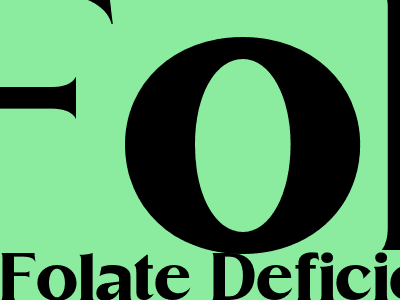Folate Deficiency: An In-Depth Look
Introduction
Folate, also known as vitamin B9, is an essential nutrient that plays a crucial role in various bodily functions. However, folate deficiency can lead to a wide range of health problems. This comprehensive article delves into the symptoms of folate deficiency, its causes, risk factors, and preventive measures.
Symptoms of Folate Deficiency
1. Anemia
Folate deficiency can lead to a type of anemia known as megaloblastic anemia. This condition is characterized by the production of abnormally large red blood cells that are unable to function properly, leading to fatigue, weakness, and shortness of breath.
2. Neurological Problems
Folate deficiency can also affect the nervous system. Symptoms may include numbness, tingling, or burning sensations in the hands and feet, difficulty concentrating, and memory problems.
3. Gastrointestinal Symptoms
Digestive issues such as nausea, vomiting, diarrhea, and constipation can be signs of folate deficiency. These symptoms can occur due to the impaired absorption of nutrients from the digestive tract.
4. Skin Problems
Folate deficiency can manifest as skin problems such as rashes, sores, or hyperpigmentation. These symptoms are primarily due to the role of folate in cell growth and repair.
5. Oral Symptoms
Gum inflammation, bleeding gums, and mouth ulcers can indicate folate deficiency. These symptoms arise from the impaired formation of red blood cells, which are necessary for healthy gums and oral tissues.
Causes of Folate Deficiency
1. Inadequate Intake
The primary cause of folate deficiency is an inadequate intake of foods rich in folate. These foods include leafy green vegetables, fruits, beans, and fortified grains.
2. Malabsorption
Certain medical conditions, such as celiac disease or Crohn's disease, can interfere with the absorption of folate from the digestive tract, leading to deficiency.
3. Pregnancy and Lactation
Pregnant and breastfeeding women have increased folate requirements to support the growth and development of the fetus or infant. Insufficient folate intake during these periods can lead to deficiency.
4. Medications
Some medications, such as anti-seizure drugs and methotrexate, can interfere with folate metabolism and result in deficiency.
Risk Factors for Folate Deficiency
- Poor diet low in folate-rich foods
- Malabsorption disorders
- Pregnancy and lactation
- Use of certain medications
- Alcoholism
Preventing Folate Deficiency
1. Folate-Rich Diet
Consuming a diet rich in folate-rich foods is crucial for maintaining adequate levels of folate. These foods include leafy green vegetables, fruits, legumes, and fortified grains.
2. Supplementation
Fortified foods and supplements can be used to increase folate intake if dietary sources are insufficient. However, it is important to consult a healthcare professional before taking supplements.
3. Regular Blood Tests
Regular blood tests can help monitor folate levels and detect any potential deficiencies early on. This is especially important for individuals at risk, such as pregnant women or those with malabsorption disorders.
Conclusion
Folate deficiency is a common nutritional problem with a wide range of potential health consequences. Understanding the symptoms, causes, and risk factors associated with folate deficiency is essential for timely diagnosis and effective preventive measures. By incorporating folate-rich foods into your diet and being aware of your risk factors, you can help maintain adequate folate levels and promote overall health and well-being.
References
- Folate Deficiency: A Review
- Centers for Disease Control and Prevention: Folic Acid
- Mayo Clinic: Folate Deficiency Anemia

Komentar